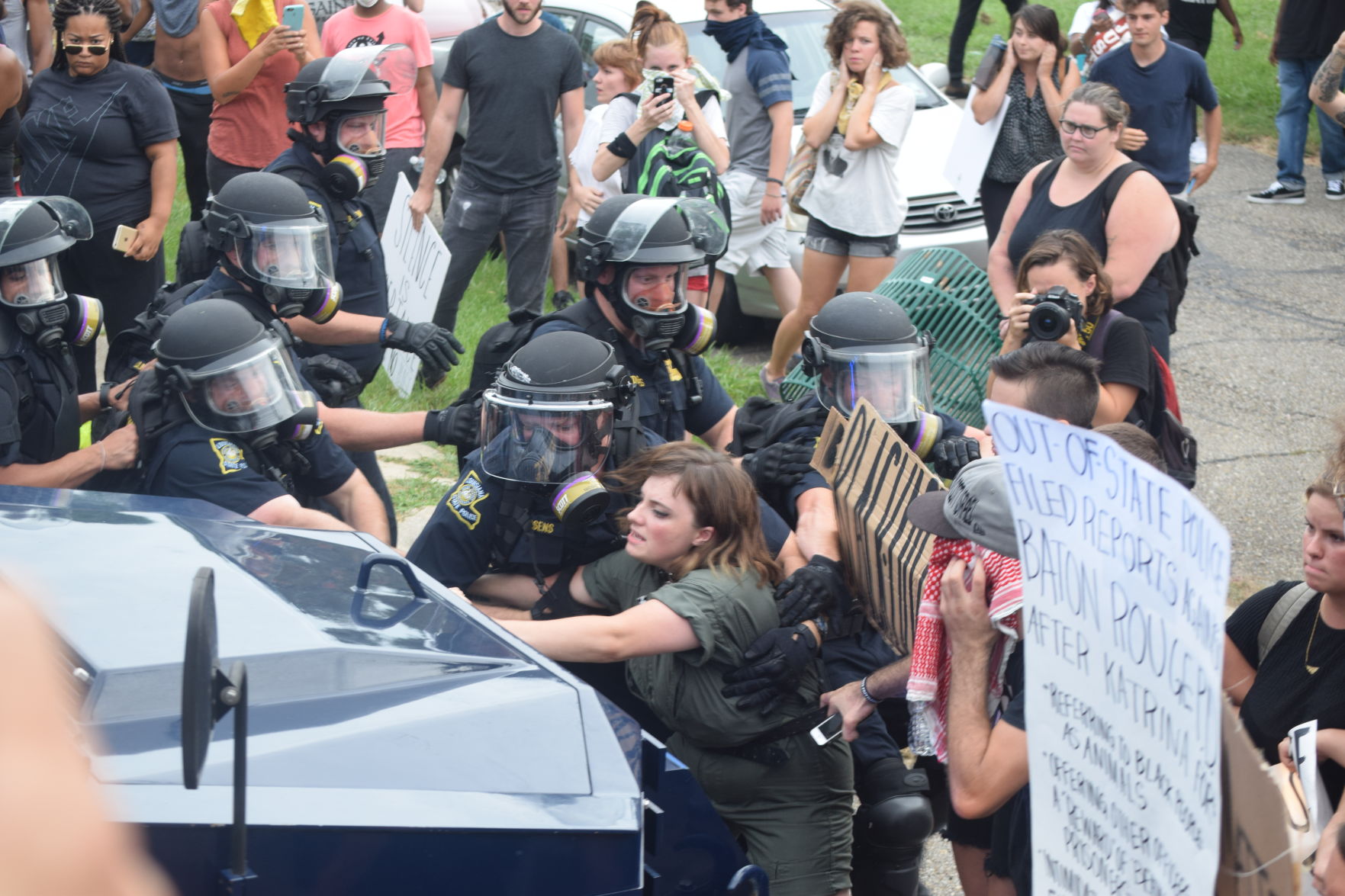
Dianna Cheramie
July 12, 2016
Plaisance named Interim Athletic Director at Nicholls
July 13, 2016Protests against a police shooting in Baton Rouge, another questionable police shooting in Minnesota and a hate-fueled gunman’s Dallas massacre of officers resulting in five deaths are touching local law enforcement officers and local residents in varying ways both up close and personal.
State troopers assigned to Troop C in Gray have already worked crowd-control assignments in Baton Rouge as demonstrators – including some from a local branch of the NAACP – protest the July 5th shooting of Alton Sterling, a black man, by a white police officer. Deputies from Lafourche and Terrebonne parishes are on stand-by to provide relief for those from other departments also assigned to demonstration duty.
Members of the Lafourche Parish branch of the NAACP have taken part in some of those marches.
On local streets, meanwhile, law enforcers of various agencies continue performing their duties 24 hours a day. They are more conscious than ever of the potential of tragedy for someone else’s family if they err at a critical moment, or for their own if they hesitate and end up not coming home again. They also mourn the officers lost to the Dallas atrocity, which amounts to a loss of family that demonstrates increased need for vigilance.
‘THOUGHTS AND PRAYERS”
Lafourche Parish Sheriff Craig Webre summed up feelings expressed by many local officers in interviews this week.
“Our nation is reeling from what is one of the most horrific acts ever perpetrated against law enforcement,” Webre said of the Dallas shootings. “The men and women of the Lafourche Parish Sheriff’s Office support our brothers and sisters of the Dallas Police Department and Dallas Area Rapid Transit through our thoughts and prayers in the wake of this horrific incident. This attack illustrates the danger and challenges our deputies face every single day. Just as Dallas Police officers ran toward the sounds of gunfire, even with their fallen officers before them, we will also not give in to fear. We will continue to protect and serve Lafourche Parish with the excellence you’ve come to expect, and the excellence you deserve. We hope you will support us in continuing to grow and unite our community –not divide it.”
Webre’s statement includes mention of the families coping with the shootings by officers.
“I ask our citizens to keep the families of the victims of this tragedy in your thoughts and prayers, as well as the families of all those involved in the incidents earlier this week in Baton Rouge and Falcon Heights.”
COPS WHO CROSS THE LINE
Terrebonne Sheriff Jerry Larpenter said truly bad police behavior must be addressed. But he asks as well why community and national outrage are not more visible regarding the long parade to the graveyard of young black men killed by friends, associates and rivals, occurrences that outnumber those killed by officers.
Larpenter said he strives mightily to remove “bad apples” from his department and looks for tell-tales that officers might be too quick to react in an unjustified fashion. Officers, he said, know what is expected of them.
“We are all trained the same way,” Larpenter said. “If someone does not comply with the verbal command it is hands on, you restrain him, you are taught to take an individual to the ground. If they keep posing a threat the use of force escalates. We are in a world where the police have to continue and arrest these bad guys and the criminal justice system is not playing its part, and the police try to apprehend someone and they refuse to give up, they refuse to comply, and the circumstances make a police officer have to kill somebody, it must be within the lines of what is called justifiable homicide. Police officers are trained and should know the difference, and when police officers cross the line they do not represent us.”
Officers interviewed throughout last week, in person as they started shifts or ended them, by telephone and text, shared thoughts and feelings with an understanding that they and their departments would not be specifically attached to their comments, since they are not usually authorized to speak publicly.
“You can’t not think about it,” said one patrol officer, confiding that the potential for error is an unfortunate given in every critical encounter.
“You can’t really think about that and let it affect what you do,” said another officer, who expressed confidence that in a crisis, rigorous training he has undergone will kick in and guide what actions are taken.
EVALUATION NEEDED
The officers understand that the stark nature of videos that show the shooting of Alton Sterling in Baton Rouge and the aftermath of Philando Castile’s shooting in Minnesota raise disturbing questions. But they also wish that television talking heads would not rush to judgement before all of the facts are in. The national discussion, however, has led some to ask whether current policies and training need to be evaluated, for greater margins of both officer and civilian safety.
“You get this real somber feeling that maybe we need to look at what we do,” a supervisor in one local department said. “I was told by a minister that maybe we need to have officers try harder to talk to people like they might ‘want somebody to talk to their mama.’”
Some supervisors are considering whether change in vocal inflection or initial handling of people when circumstances allow, might make risky encounters safer for civilians and officers.
Affirmative tones that grew stronger in the decades-long war on drugs might be better muted, some said. A greater emphasis on community relations and public outreach, some said, might ease the potential for violent confrontations.
The reality check imposed by the Dallas mass slaying of officers is causing some who patrol local streets to be more aware of their surroundings, despite beliefs that doing so is already second nature; the Dallas case makes emotions raw in ways many won’t or cannot discuss.
“I can’t allow myself to think of what it would be like to feel that I am more vulnerable,” one local officer said, when asked if he was feeling more like a target.
COMMON PRECURSORS
The risks are ever-present and can come at a moment’s notice. On Friday in Gray, Terrebonne deputies responded to a report of a man who had threatened both his mother and father with a gun, and was traveling through his neighborhood with the weapon.
Officers swarmed the neighborhood near Champion Drive and as they sought the person they were told he had said he would kill officers who tried to arrest him. Jamal Tillman was spotted and apprehended without a shot being fired. He had already ditched his weapon. Tillman was booked on two counts of aggravated assault with a firearm and one count of obstructing justice.
A day later deputies in Terrebonne searched streets in the normally quiet Broadmoor subdivision for a domestic violence suspect, who at one point was seen walking behind a house but disappeared. Had a foot chase resulted, potential for a negative encounter could have been great. Studies of police-related shootings show that a chase or street encounter is a common precursor.
The frustration for law enforcement officers in times like the present is that presumptions officers have acted outside the law in a shooting situation – particularly when the civilian is unarmed – are rampant, and not based on the highly technical standards that existing law and practice demand.
“In most cases the first narrative that comes out is never the full story,” said Sgt. Brennan Matherne of the Lafourche Sheriff’s Office. “In some cases it is even fabricated. Once the court of public opinion has decided it does not matter what the court of law decides. The public makes up its mind and there is no way to change that. You can have people clamoring over an injustice when there has not been a judgement yet, a decision based on all facts has not been made yet.”
NEW INFORMATION
In the Baton Rouge case, evidence is mounting that points to potential justification. On Monday the Baton Rouge Advocate reported new details of the Sterling shooting based on a search warrant affidavit filed in court. The newspaper cites a claim that officers struggling with Sterling saw the butt of a handgun in his front pocket and saw him reaching for it before firing.
If true, that would place Sterling’s shooting in the category of those where deadly force is deemed warranted, as opposed to the five percent of police shootings where an individual is unarmed. Black men are victims in the majority of cases where the person shot is unarmed, according to national studies. White victims outnumber blacks in police shootings overall.
Just as police officers are affected by the current scrutiny – and the tragedy in Dallas – some local voices say it is important for them to show support to the families of shooting victims.
A half-dozen members of the Lafourche Parish NAACP traveled to Baton Rouge Sunday and took part in a rally outside the convenience store where Sterling was killed.
The group’s president, Burnell Tolbert, said they traveled to Baton Rouge to join the state’s NAACP president, Ernest Johnson, to show support for Sterling’s family.
“It’s been a whole lot of talk, it’s been a whole lot of marching, it’s been a whole lot of backwards and forwards about race,” Tolbert said. “Race is the bottom line. And if we don’t just stop talking about some kind of changes in the laws and the way police interact with the black community. Of course it don’t just happen in the black community, but it happens mostly in the black community. If we don’t get some kind of changes with the way officers interact with minorities and black communities, this is going to continue. It’s not going to stop.”
Tolbert said he recognizes that officers who mistreat or disrespect black people are only a small sampling of the whole. Negative repercussions for officers – including the attack in Dallas – arise from actions by officers such as the shooting of Sterling, which based on what he has seen was unnecessary.
“Take for instance what happened in Dallas,” Tolbert said. “That’s from what happened here, that’s from what happened in Minnesota. So, seems like it’s now is the majority of the talk that I’m hearing is about giving police more protection.”
OPENING OLD WOUNDS
For some locals, the Baton Rouge and Minnesota cases hit especially mournful chords. Wyteika Tillman of Houma, whose 14-year-old son Cameron was killed by a police officer in Village East, said the current state affairs is affecting her greatly. Tillman is still involved in litigation against the Terrebonne Parish Sheriff’s Office in connection with the incident. The shooting was ruled as justified by a grand jury, a decision based in part on testimony that Cameron Tillman had a realistic looking pellet gun in his hand when he opened the door of an abandoned house on Kirkglen Loop after deputies responded there.
“It opens up wounds in my heart,” Tillman said. “I have Jehovah now and he is helping me through all of this. I was horrified when I saw the video.”
Tillman was also saddened by the shooting of officers in Dallas.
“It hurts me to see that because any loss of life is horrible,” Tillman said. “I was horrified. Nobody deserves that, not even the families of officers who kill innocent people. My heart was wrenched out and stabbed over and over again. Hating one another is not the answer. But the police are not taking accountability for what they have done, they are used to no verdicts, they don’t hold officers accountable and now good officers are suffering. They investigate each other and cover up. This is why people do not trust the law.”
CROSSES AND CUPCAKES
In Lafourche and Terrebonne, meanwhile, there has been no lack of showings of support for law enforcement officers and the work they do.
At Houma Police headquarters last week, 12-year-old Robert Ruckhaber Jr. made a special delivery, of medallions depicting Michael the Archangel. St. Michael is regarded as the patron saint of police officers.
For Ruckhaber and his mother, Chasity Woodson, the gesture – repeated at State Police Troop C – was meant as a salve to the effects of the Dallas tragedy.
“My heart weighs heavy for all law enforcement officers and the military,” said Woodson, who also recognizes how cases like the Sterling shooting strain relations between law enforcement and the community, as well as civilians of different races. “It’s been a while since we all went to church and held hands with all different races.”
Religious talismans and amulets are not the only gifts officers received. Pizzas, home-baked cupcakes and pies, breakfast meals and other goodies found their way to officers all weekend. Some of the good-will gifts were anonymous; one care package had a note attached which said it was from “the Billiot family.” Victory Christian Center sent other food gifts. Pizzas were sent by individual donors and from Papa John’s on Houma. At the Terrebonne Sheriff’s Office deputies said they were promised crosses to wear fo protection, by a church group.
“It’s a nice feeling to know that people are behind us, that they appreciate what they do,” said Lt. Brian Falgout of the Sheriff’s Office, sentiments echoed by Houma Police Chief Dana Coleman, who said “we have been receiving an abundance of community support.”
Statewide, the focus of attention is currently on Baton Rouge, where some local officers could end up being stationed as relief for those who have worked to contain protests to authorized routes.
The question for them will be how intense efforts by some protesting groups will become in terms of attempts to deviate. While remaining non-violent, protesters have not always been compliant, and the friction has caught the attention of some powerful advocates who have offered sharp criticism.
Marjorie Esman, executive director of the ACLU of Louisiana, accused police of using illegal force.
“We were on the scene and witnessed police in full riot gear with assault rifles while individuals were exercising their lawful rights and posed no threat,” Esman said. “The police lunged and grabbed at peacefully assembled people and threw them to the ground. Such misconduct violates the constitution and is serving to escalate an environment already filled with tension.”
Esman said the police are depended upon “to protect and serve everyone in our communities, to treat people fairly, to use violence only as the very last resort. But the Baton Rouge police have failed us. They failed when they encountered Alton Sterling. They failed when they lashed out at people protesting in peace. The ACLU stands with the protesters in Baton Rouge and urges the police to honor our constitutional rights instead of stomping on them.”














